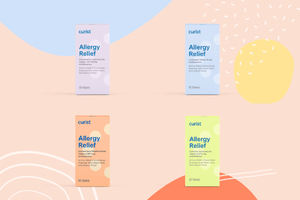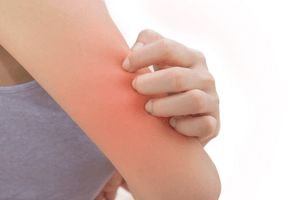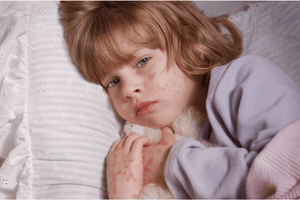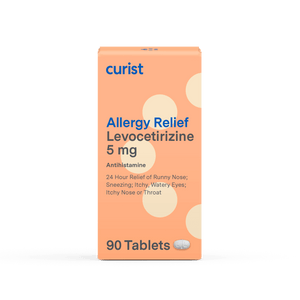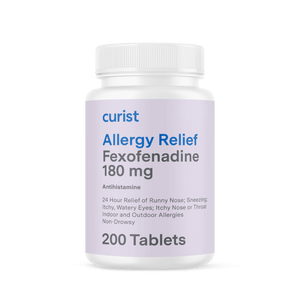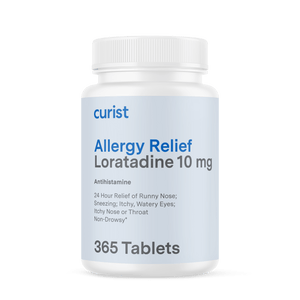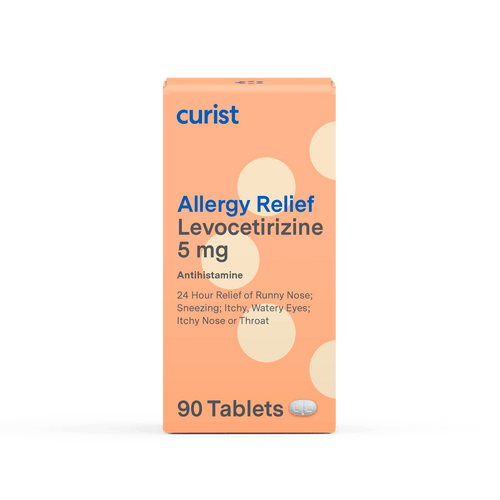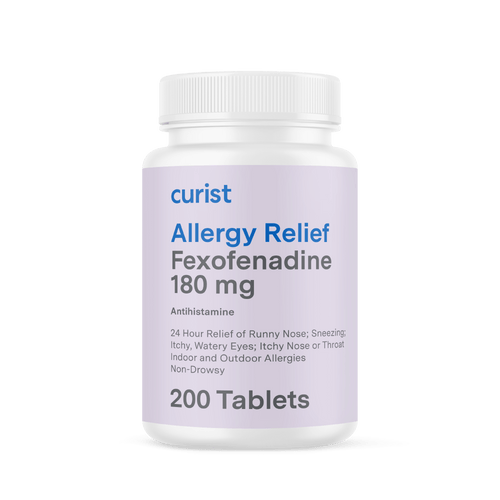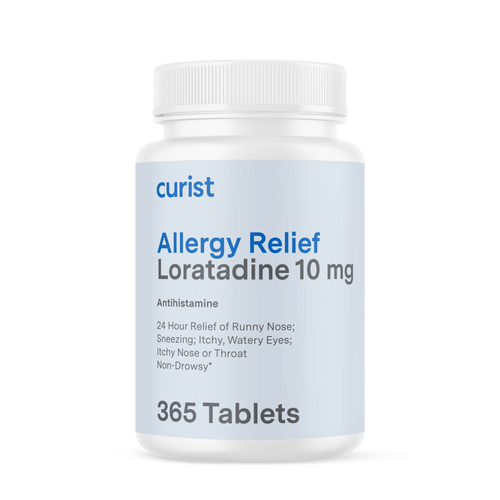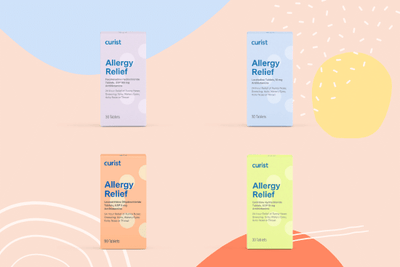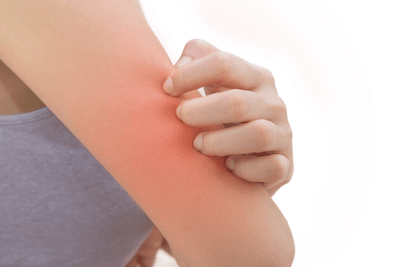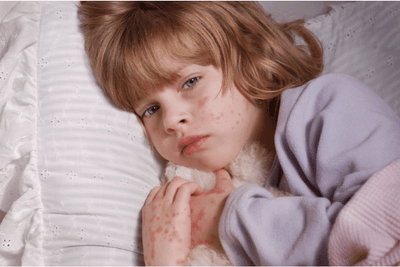Curist delivers over-the-counter medicines to your door at a fraction of the price of traditional brands. We hope everyone stays safe and healthy during this time.
Are you feeling uncomfortable because your eyes keep watering? Your eyes can water or tear up for many reasons, including weather, allergies, or more seriously, an infection. Keep reading to learn more about what may be causing your watery eyes and what you can do to bring some relief!
What are Tears vs Watery Eyes?
Tears are essential to your eye health. They help the eye stay hydrated and offer protection from bacteria, dust, dirt, and other irritants. However, if your eyes make too many tears, it can be bothersome in your everyday life. Watery eyes, also known as epiphora, is a condition where your eyes overflow with tears without any obvious reason.
Watery eyes can affect people at any age, but it tends to be found more often in babies under 12 months of age and in elderly people. This condition can affect one or both eyes, and you may experience blurry vision, redness, itching, crusting on your eyelids, and/or light sensitivity.
Why do My Eyes Water?
Before we talk about what can cause your watery eyes, let’s understand how your eyes and tears work. Tears are made in the tear glands to help clear stuff out from your eyes and to keep your vision clear. Ideally your tears help protect the front surface of your eyeballs and are just thick enough to clear dirt and particles off your eye. Once tears are produced, they drain into small tubes called the tear ducts towards a temporary storage place called the tear sac. Now that we have a better understanding of this process, let’s explore what can cause watery eyes.
What Can Cause Watery Eyes? Are My Watery Eyes from Allergies?
There are 2 main causes for excessive (or bothersome) watery eyes:
- Overproduction of tears by tear glands
- Inability to drain tears from tear ducts or tear sac
Naturally, your tear glands will produce tears to protect your eye, but if it makes too many tears it can be bothersome. If you find yourself tearing up suddenly, pay attention to what you’re doing or the environmental factors you’re being exposed to when it occurs, as this might help explain why it is happening. Some things that can lead to the overproduction of tears are:
- Irritants: Chemicals, fumes, dirt, small pebbles
- Environmental: Smoke, cold weather, allergens, and strong winds
- Scratches or Inflammation
- Eyelash or eyelid issues
- Medications and chemotherapy
Another reason for excessively watery eyes could be that your tear ducts start to narrow and won’t allow tears to drain properly. Depending on your age, here are some common explanations for watery eyes:
- In newborns up to 3 months old, their tear ducts are still developing so it may take a couple of weeks before their eyes can easily clear their tears. As long as there are no other alarming symptoms, doctors may recommend just keeping an eye on their condition and waiting for their tear ducts to fully develop.
- In teenagers and adults, tears ducts can be narrowed and blocked due to swelling or scarring, which stops tears from naturally draining. Since the tears cannot drain, they stay on your eyes and make it hard for you to see or read. Tears should drain out of the tear sac and into the nose, but with blockages, they will stay in the tear sac and may lead to an eye infection.
What is the Best Way to Prevent Watery Eyes?
If you started experiencing watery eyes recently or if you notice it happens occasionally, try out some of these tips at home to help prevent watery eyes:
- Take a break from screens to allow time for your eyes to rest
- Avoid areas with a lot of air movement or smoke
- Wear sunglasses outside
- Use a warm, wet cloth on your affected eye
- Do not share towels or washcloths that touch your eyes
- Wash your face or use clean eye wipes
- Clean off eye makeup before sleeping
- If you use contact lenses, clean and store them according to instructions
- If you have pet allergies but love your furry friend, try to avoid touching your face or eyes after direct contact. Make sure to wash your hands frequently!
How do I Treat Watery Eyes from Allergies?
For watery eyes caused by seasonal allergies, you can use oral antihistamines ahead of time to prevent or lessen any symptoms. The newer, second generation antihistamines like loratadine (brand Claritin) or fexofenadine (brand Allegra), or even a third generation antihistamine like levocetirizine (brand Curist) last 24 hours and cause less drowsiness than the older, first generation antihistamines like Benadryl (diphenhydramine).
For faster short term relief, we recommend using over-the-counter eye drops. However, it is important to note that long term use of eye drops that include ingredients such as naphazoline/pheniramine (vasoconstrictors) may worsen eye redness and irritation. Eye drops with ingredients such as glycerin or carboxymethylcellulose, which are also known as “ophthalmic lubricants,” are better as they can help lock in moisture to ease eye irritation.
If you need help picking the right eye drops or have questions on how to use them properly, consult your local pharmacist for their recommendations based on your specific needs. If you have an infection, refer to your doctor immediately for the appropriate antibiotic eye drops.
How do I Treat Dry Eyes?
Dry eyes is also another condition that can cause excessive tear production and watery eyes. This is because your eyes are trying to make tears to coat and lubricate the eye, but the tears turn out to be too thin and runny. In order to compensate and to ease the irritation, your eyes make a lot of tears. In this case, you may use lubricating eye drops or artificial tears to keep the outer part of your eyes moist. If symptoms start to get worse over time, for example if it starts to burn, feels lumpy, dry, or if your vision starts to get more blurry, you should immediately contact a doctor and schedule an eye exam.
Can Antihistamines Help with Watery Eyes?
During allergy season, you may experience a range of symptoms as your body has an immune response to things like pollen or dust. Allergies can cause runny nose, sneezing, and watery eyes. There are several things you can do at home to help control your allergies, but over-the-counter medications like antihistamines can lessen or prevent symptoms like watery eyes from ever occurring if you take them early and consistently. Loratadine (brand Claritin), fexofenadine (brand Allegra), or levocetirizine (brand Curist) are great options for antihistamine with less drowsiness.
For quick, short term relief you can use eye drops that have antihistamines. For eye drops that also include decongestants (naphazoline/pheniramine), do not use them long term as they can worsen eye redness.
Which Antihistamine is Best for Watery Eyes?
Levocetirizine (brand Curist) is one of the best oral antihistamines to treat allergy symptoms, as it is minimally drowsy and designed to work for 24 hours with daily use. Unlike older antihistamines like diphenhydramine (brand Benadryl) which can cause drowsiness, newer antihistamines like levocetirizine provide excellent allergy relief but without the same level of sedation. Other antihistamines to consider for treating watery eyes caused by antihistamines include loratadine (brand Claritin) and fexofenadine (brand Allegra). However, as everyone’s body is different, choosing the best antihistamine to treat watery eyes one may also depend on what other allergy symptoms you have and what antihistamine works for you.

